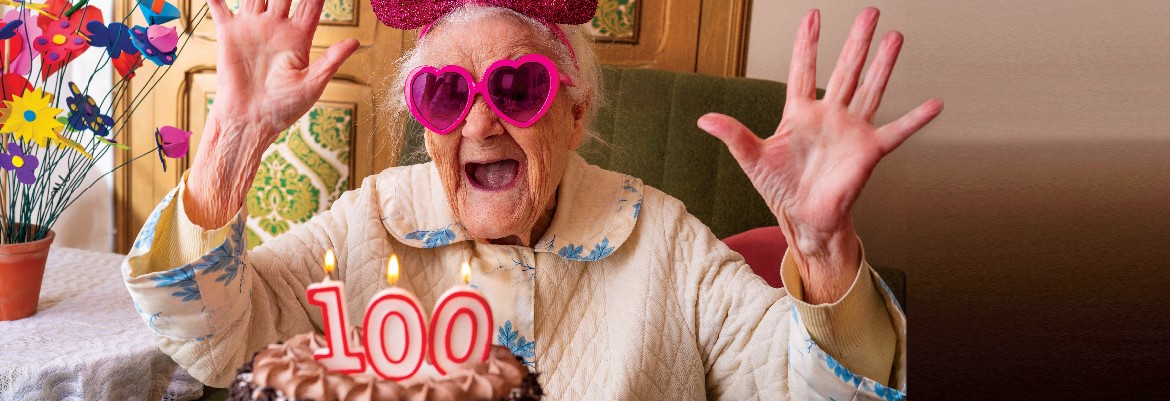Ageing & Frailty
Lifespan was short until recent times, due to trauma (including war), poor nutrition and disease. The population is ageing due to increased survival into adulthood, and then people living longer into old age. The population aged over 65 years is rising; in the UK this is now 15 per cent of the population, while in Japan this figure is as high as 27 per cent. [2]Lifespan in the UK has now increased to 90.2 years and 87.6 years, [3] with women outliving men. There were only about 100 people aged 100 years and over in the UK around the time of the First World War, but the total has steadily risen, doubling every year since the Queen came to the throne in 1952. Now, there are around 14,570 centenarians in the UK and a significant surge in people reaching their 105th birthday and beyond. In 1985 there were 130 people aged 105 and over, whereas last year saw 850 reaching their 105th birthday. [4]
The Old Testament provides many references to age. Some are vague; ‘he lived to a ripe old age‘ (Isaiah 46:4) and Psalm 139:16 states that the number of days is written in God’s book. Others are more specific, ‘three score and ten‘, and the lifespan of a king was 70 years. [5] Is there a maximum lifespan that we could hope for? Science has suggested that living to 120 years is possible, with healthy living, including dietary restriction. This aspiration, interestingly, is in line with the biblical line that ‘but with a maximum of 120 years and then the time to die comes‘. [6]
At the time of writing, the oldest person in the world is a lady from Japan of 117 years.
Frailty
Frailty is a biological state, comprising weakness, loss of muscle strength and fatigue. The presence of frailty and its severity is assessed using a myriad of scales. [7] As people get older, they are more likely to be dependent on others and have multiple medical conditions, either due to pre-existing conditions from childhood, or newer, but just as debilitating as long-term conditions (dementia, stroke, heart disease, diabetes, renal disease). The prevalence of frailty increases with age. 30 per cent of those aged over 85 years will be frail. This does not sound like many but bear in mind that Western populations are ageing; the fastest-growing cohort is those who are very old (over 85).Frail people have a limited physiological reserve, such that they are unable to respond adequately to minor insults such as medication changes, constipation and infection. Decompensation occurs resulting in delirium, immobility, dysphagia and functional decline, full recovery from which is far from certain. [8]
For example, when David was old and in his last years of life, he could not keep warm despite the use of covers, suggesting that he had little body fat and perhaps could not regulate his own temperature. [9]
Frailty is one of the latest NHS buzz words. Resources are devoted to it, with the Acute Frailty Network driving change [10], as if this was all a new concept. In reality, it is just a rebranding, enabling geriatric medicine to get back to its roots.
Geriatricians have been looking after frail people for many years. They are rediscovering community care and Day Hospitals, though of course they are now called Frailty Units and Frailty Clinics. Once you rebrand something, everyone jumps on the bandwagon. Networks spring up, charging hospital organisations a lot of money to teach them to ‘suck eggs’.
Old age and frailty are commonplace in the biblical narrative. At times God used age to demonstrate how great he was. Examples include the births of Isaac to Abraham and Sarah 11 and John to Elizabeth and Zachariah. 12 Isaac was almost blind and on his death bed when he blessed the wrong son, Jacob. [13] Simeon was old and waiting to see the saviour before he died. [14] Paul also alluded to his infirmities including (possibly) his eyesight. [15]
One of the characteristic features of frailty is the presence of comorbidities.
The writer of Ecclesiastes provides a description of frailty that could have been written today. [16]
Remember your Creator in the days of your youth,
Before the days of trouble come and the years approach
when you will say’I find no pleasure in them’ —
Before the sun and the light and the moon and the stars grow dark,
and the clouds return after the rain;
When the keepers of the house tremble,and the strong men stoop,
And the grinders cease because they are few,
and those looking through the windows grow dim;
When the doors to the street are closed and the sound of grinding fades;
When men rise up at the sound of birds.but all their songs grow faint;
When men are afraid of heights and of dangers in the streets;
When the almond tree blossoms and the grasshopper drags himself along
and desire is no longer stirred.
Then man goes to his eternal home and mourners go about the streets.
The slowing of ageing and frailty
Can ageing and frailty be reversed? Nutrition, sarcopenia (loss of muscle mass) and frailty are interlinked. It is possible to prevent or reverse frailty if people are identified early when they are either mildly or moderately frail. The provision of good nutrition and supplements combined with exercise can reduce muscle loss, increase strength and minimise fatigue. Such intervention could extend life by 14 years for women and twelve years for men; if this is continued women could live 34 and men 31 healthy years after the age of 50. [17]
The writer of Psalms tells us that ‘A man’s days shall be 70 years, 80 if he has the strength‘ [ie is in good health and is still able to exercise] (Psalm 90:10). Yet in Isaiah 65:22, God says that those who live to less than 100 years will be accursed and he who dies at 100 will be considered youthful. Moses is a good example, he lived until he was 120, yet his eyes were not weak, nor his strength gone. [18]
Health consequences of age and frailty
Frail older people will have multiple medical problems. Physically, their ability to rise from a low chair may be limited, gait speed reduced and risk of falling increased, and continence may be an issue. Many old people will often say, ‘I was alright until … and then everything went downhill!’
Frailty, sarcopenia, diabetes, cancer, heart failure are all associated with pro-inflammatory states and a reduction in immunity which contributes to recurrent illness and admissions to hospital. Each hospital admission is associated with a steady downward spiral of increased dependency and frailty. By the time geriatric medicine services become involved, people are often severely frail (7-9 on the Clinical Frailty Score 19) and sarcopenic, and it is too late to reverse the underlying problems.
People presenting with severe frailty will have significant mortality over the ensuing six months.
Social consequences
There was a time when old age was seen as a marker of wisdom and knowledge. Old people were to be revered and respected. ‘Do not rebuke an older man harshly, but exhort him as if he were your father.‘ (1 Timothy 5:1) In more modern and enlightened times, being old is seen a curse; people are side-lined, ignored, abused and forgotten. People have become more isolated and alone. Families are smaller, more disparate and less able to provide support. Slowly the circle of friends and family may decrease due to social mobility and death. This may result in loneliness and the dangers associated with old age increase, ‘…pity the man who falls and has no one to help get him up!‘ [20] Many old people become house-bound or need to move into a care home, which may be away from friends and their local church, adding spiritual isolation to their sense of loss and despair.
What can we do?
We will meet frail and aged people in all kinds of places and situations. We need to act as a mirror reflecting God’s glory to them and showing his love in our actions. Be prepared to listen to stories that you may have heard before and offer support when required. Offer advice to church leaders on how to adapt buildings (ramps, contrasts, lighting and accessible toilets). Providing higher chairs for those with difficulty getting out of a low one and removing rugs and loose wires to prevent accidental falls are all essential considerations. Full engagement in a church service requires reasonable hearing and eyesight. In the days of hymn books, you might have found a braille edition, today with the reliance on visual aids, computers and screens, the blind and partially sighted could become isolated within the congregation. Encourage preachers and presenters to speak clearly and not too rapidly for people with hearing loss. Hearing loops are not always working, and there may be a background hum.
Simple changes and accommodations can help older members of our congregations remain practically, mentally and spiritually engaged with the worship and life of the church, and so help reduce the risks of frailty.









